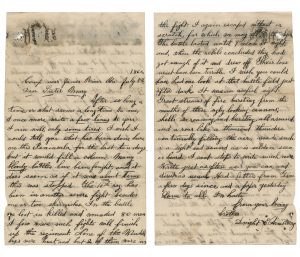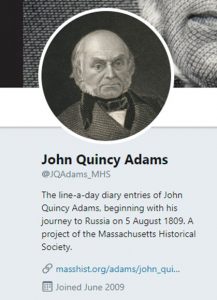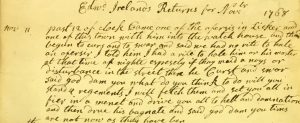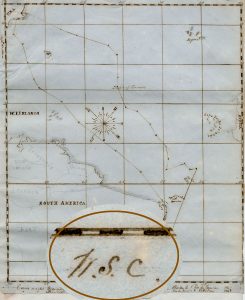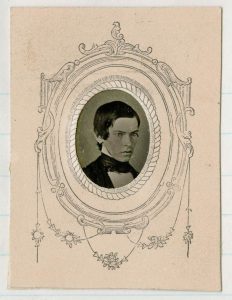By Anna Clutterbuck-Cook, Reader Services
Today, we return to the diary of George Hyland. If this is your first time encountering our 2019 diary series, catch up by reading the January, February, March, April, May, June, and July 1919 installments first!
August if full of fruits and vegetables from the garden: cucumbers, blackberries, apples and pears, “lettuice,” green beans, turnips, beets, and potatoes. George is also offered a peck of clams that he turns down because “I do not do any cooking” (though on another date he mentions making moss pudding). George is winding down his three month tenancy at “the James place,” with its spacious garden, and toward the end of the month begins moving his belongings into new quarters above J. H. Vinal’s store. On August 10th he has his picture taken. On August 16th he takes the train to Boston and — amidst other errands — attempts to learn why he was not called into service during the Great War. On August 24th a “thunder tempest” rolls through that he reports in his diary was “very destructive … in all parts of New Eng.” Throughout the month, George finds an hour or more most nights to play upon his guitar.
Enjoy another month with George as we close out the summer and head into autumn.
* * *
PAGE 339 (cont’d)
Aug 1. rain all forenoon. Spent forenoon at Charles’s. Had dinner there. In aft. worked 3 hours for Fred J. Bailey’s at N. Scituate Beach digging and filling up a trench. Elmer Ramsdel laid and fitted the pipes (tiles) trench about 45 or 50 ft. long. fin. the job. rode down and back in auto. aft. par. clou. to clear. W.S. at the seashore. 3 seaplanes passed there this aft. low down over the water. Mrs. M.G. Seaverns gave me a banana early in eve. I gave her some lettuice [sic] — from my garden. Eve. clear. W.N.W. Charles called here in eve.
2d. In forenoon worked at home (on James place) mowing with scythe, lawn mower, sickle and shears. In aft. went to Rockland via Norwell and Hanover. Charles, Lucy, Ellen, Uncle Samuel, Irene, and I rode there with George Hardwick — in his large auto. Emeline and Henrietta and Ethel also went there — at Edmund’s. Fine weather, W.N.W. clear, arr. home about 4:10 P.M., then worked on the place 2 hours. Sarah rode from Geo. Hardwick’s place with us — to Charlie’s place — and went back with them (Ellen and Irene). Fine eve. clear, cool. Played on the guitar 1 hour late in eve.
3d. (Sun.) Fine weather – clear; W.N.W. Called at Charlie’s in eve. Then went to Francis Hyland’s and spent part of eve.
PAGE 340
August 1919.
4th. Cut up boxes and housed the wood — 7 hours for Mrs. M.G. Seaverns — 2.10. Hot weather — tem. 74-90; W.S.W. late in aft. picked the first cucumber from vine in my garden — gave it to Mrs. Seaverns. Played on the guitar 1 hour in eve. also worked in my garden early in eve.
5th. Dug up ground in poultry yards for Mr. S. T. Speare – 5 1/4 hours — 1.65. Hot weather tem. 70-88; W.S.W. Played on the guitar 1 hour in eve. Mrs. Ethel Torrey sent me 2 doughnuts this A.M.
6th. In forenoon — mowed the lawn and bank and other places 2 hours for Mrs. Eudora Bailey (did not charge full price). In aft. dug up ground in poultry yards 1 1/2 hours for S. T. Speare — 45. Began to rain about 2:20 P.M. rain heavy at times all aft. and all night. W.S.W. Played on the guitar 1 1/4 hours in eve. Mrs. Torrey gave me a qt. of milk.
7th. Very wet. rain until about 9 A.M. cloudy all forenoon. aft. par. clou. W.S.W. warm. In aft. cleared Mrs. Eudora Bailey’s trees of Gipsey [sic] moth nests (eggs and millers). She helped me do it. She is 79yrs of age. Mrs. Ethel Torrey sent me a pint of milk. Her daughter margaret brought it here. Eve. clear. Fine weather.
8th. Fine weather, tem. About 68-87; W.W. very wet in forenoon. In aft. Went nearly to Scituate Cen. to see if I could find some blackberries — got 1 1/2 cupfull. Stopped about 1/2 hour at the old house on mile 8 of […] carried 2 cucumbers and some lettuice to Mrs. M.G.Seaverns’ late in aft. She is 80 yrs of age — to-day. Saw Mrs. W. I. Lincoln at store. Fine eve. cool. Called at Mrs. Irene Litchfield’s early in eve. She came here to get me to repair a bucket — could do nothing with it — not worth repairing — she gave me a piece of choc. cake. Played on the guitar 1 hour late in eve.
9th. Worked 1 hour for Mr. Speare — 30. and 3 hours for Mason Litchfield — mowing lawn and bank — 65. Fine weather; W.W. cool. clear. eve. very cool. clear. W.S.W. Played on the guitar 1 1/4 hours in eve. I also worked 4 hours on this place — mowed and trimmed the grass on the whole place — also dug up some ground and transplanted some late turnips — also thinned out the plants in the rows where I planted the seeds.
10th. (Sun.) Very fine weather. Clear. cool. W.N.W. Went to W. I. Lincoln’s about 12:30. Staid [sic] about 2 1/2 hours — had dinner there. We all had our pictures taken in aft. then I went up to Uncle Samuel’s. Had supper there. Sarah and I went to my home. Sarah with me every minute I was up there. We picked a bouquet of wild flowers and carried them to Mt. Hope Cem. fine eve. arr. Back at 9 P.M. — rode there and back with W. I. Lincoln — He went to Mt. Blue Spring to get a load of water. I made a moss pudding late in eve.
11th. Worked 6 hours for Mrs. M. G. Seaverns — mowing and raking grass — 1.80 fine weather, cool sea breese [sic] — W.S.E. fine eve. Played on the guitar 1 1/4 hours in eve.
12th. Worked 6 1/2 hours for Mr. Speare — (mowing grass near the house, and made a path around 3 sides of his woods and a path through the centre — bushes, trees, and briars) — 1.95. Also worked haying for 2/3 hour Mrs. M. G. Seaverns — 20. Fine weather, clear, W.S.E. Played on the guitar 1 1/2 hours in eve. Mrs. Torrey gave me a pint of milk. Mr. Speare gave me a sythe with snath.
13th. Worked 5 hours for Mr. Speare — made another path in the woods and back of poultry yards — bet. poultry yards and a stone wall — 1.50. Sold 10 cucumbers (to sell in his store and markets) 25. (To Job H. Vinal) Job gave me about a pound of Hamburg steak (meat). Mrs. Torrey gave me a pint of milk […] par. cloudy — damp, W.S.E. a few sprinkles of rain in eve. Played on the guitar 1 1/4 hours in eve. Rain in night.
14th. Cold storm — W.N.E. rain and mod. gale — 30m. Light rain in eve. W.N.E. repaired some of my clothes. Played on the guitar 1 1/2 hours in eve. Kept a fire in stove all day and eve. Cold for season.
15th. Worked 8 3/4 hours for William Carter (he paid me for 9 hours work) — 2.70. Forenoon misty, very damp, W.N.W. aft. par. clou. (clearing) eve. Clear very fine eve. Played on the guitar 1 1/4 hours in eve. Mrs. Carter gave me some tea — enough for several meals. I had none, and worked so late that the stores had all closed when I finished the work — dug up and repaired their driveway — about 300 feet in length.
16th. Went to Boston on 7:55 A.M. tr. Paid $15.00 on a Victory Loan Bond at the State St. Trust Cos. Bank — 33 State St. Also went to the U.S. Custom House to see if I could find out the reason I was not taken into the service of the U.S. Merchant Marine when the country was engaged in the Great War — I signed an application (blank) and filled it out and thought I was to be put into active service but I was not. The officer who had charge of the recruiting is not there now, and I could find out nothing about it but the chief officer who has charge now told me to go to the shipping office at No. 20 Atlantic Av. and prob. they would put me in the service in some capacity, but the war is ended and I do not take much interest in it now, but perhaps I may later on. Returned on the Stm. “Mayflower” to Nantasket. Spent aft. there — Band concert by Carter’s Band of Boston. Went to Hingham on Elec. Car — then tr. to N. Scituate. Fine weather, fine eve. W.S.E. Played on the guitar 1 1/4 hours in eve.
17th. (Sun,) Par. cloudy; W.S.E. Mr. Bullard called here in forenoon, gave him some lettuice. Cloudy. Mrs. Eudora Bailey called here this A.M. to see if I would like to have some clams — her daughter, Sarah, sent her a half a peck. She said I could have them if I wanted them but I do not do any cooking.
18th. Mowed lawn and raked up apples 1 3/4 hours for E. Jane Litchfield. Had dinner there. Walked up and back. Very damp. Began to rain about 1:45 P.M. Got wet. Staid at Uncle Samuel’s in aft. Sarah and Hester Fish came and played housekeeping. I gave them some choc. candy (5cts). Sold 5 cucumbers to J. H. Vinal this A. M. — to sell in his store. Bought a quart of milk at Mrs. Merritt’s. Ethel got it for me. Rain all aft. W.E. eve. clou. Played on the guitar 1 1/2 hours in eve.
19th. Fair. W.S.E. Went up to Uncle Samuel’s — staid 3/4 hour. Had dinner there. In aft. worked 3 1/2 hours for E. Jane Litchfield — mowing and raking grass. 5 hours in all — 1.00. Walked up and back. Bought some milk at Mrs. Merritt’s. Ethel got it for me. Played on the guitar 1 1/2 hours in eve.
20th. Mowed lawn and around the house. 2 1/3 hours for Mason Litchfield — 70. and mowed lawn and trimmed bank 2 3/4 hours for Mrs. Eudora Bailey (6th time) — 2.00. Clear. Warm. W.S.W. tem. About 68-85. I have hired a house to move into when I leave this place. Fine eve. Played on the guitar 1 1/4 hours in eve. Sold 11 beets and 1 qt. of green beans to Mrs. M.G. Seaverns this A.M. — 10. Also 4 cucumbers for Sarah — 20. She will have […].
PAGE 340
August 1919
21st. Mowed 5 hours for Mrs. Caroline Litchfield — 1.00. Walked up and back. Had dinner at E. Jane Litchfield’s. Gave Sarah the money (20cts) I got for the 4 cucumbers I sold for her. Hot weather — tem. about 67-86; W.N.W., E., S.W. stopped at Geo. Crosby’s to see his well — over 20 feet of water in it. Played on the guitar 1 h. 20 m. in eve. Late bought some milk at Mrs. Merritt’s.
22d. Mowed and trimmed grass and did other work for Mrs. M.G. Seaverns — 4h — 1.20. Also mowed a place in a great field — near a very large elm tree (for the young friends of Mrs. E. to have a picnic) for Mrs. Bayley Ellis — 1 3/4 hours — 50. Mrs. Ethel Torrey gave me a pint of milk early in eve. I got a pail of water there. Hot weather — tem. About 67-87. W.W. clear. Played on the guitar 1 1/4 hours in eve. Made a moss pudding and boiled some turnips. Sold about 2 qts of apples for Sarah (got 15cts for them) I sold 7 of my cucumbers to J. H. Vinal — 10. and 12 turnips to Mrs. Bertha Bates (nee Hobson) — 10.
23d. Worked 3 hours for Wm. Carter. 90. 2/3 hours for Mrs. M.G. Seaverns, 20. 4 1/2 hours for Mr. Bullard, 1.35. Gave Mrs. Bailey Ellis some lettuice in eve. Hot weather, W.W. clear. Tem. 68-87. Played on the guitar 1h. 20m. in eve
24th. (Sun.) Very hot and muggy, W.S.W. tem. 75-95. Thunder tempest and rain began at 4:45 P.M. continued for 5 hours — 11 P.M. rain has stopped but tempest still continues E. of here. Thun. storms always go from the N.W. to S.E. Boiled some turnips, beets and potatoes (from my garden) in eve. The thunder storm was very destructive. Was in all parts of New Eng.
25th. Rain until about 3 P.M. Eve. clear. Played on the guitar 1 1/4 hours in eve. Cut wood 1/2 hour for Francis N. Hyland in forenoon — in woodhouse.
26th. Worked 6 hours for J. H Vinal — 2.00. Had dinner there. J. H. V. and I mowed with sythes — I also trimmed with sickle and shears. Emma V. mowed with lawn mower. I sharpened it. Fine weather. Fine eve. tem to-day about 65-83. Rode 1/2 mile with [blank space] in auto this A.M. (He works for F. J. Bailey) walked back. Played on the guitar 1h. 20m. in eve. Worked haying ¼ hour A.M. for Mrs. Seaverns.
27th. Worked 6 1/4 hours for J. H. Vinal — mowing — 2.00. Had dinner there. Fair in forenoon. Very damp and clou. in aft. Showers at times. Played on the guitar 1 1/4 hours in eve.
28th. In forenoon moved some of my things into Scott Gannett’s tenement over the store — J. H. Venal’s store. In aft. picked pears 1 hour for Mrs. Eudora Bailey and picked pears 1 1/4 hours for Mrs. M.G. Seaverns — also worked haying 1/2 hour — 45. Played on the guitar 1 1/4 hours in eve. Stayed in new house to-night.
29th. Worked 3 1/2 hours for Mrs. Ethel Torrey — improving walk — and trimming grass. — 1.05. In aft. went up to Uncle Samuel’s. Gave Sarah the money (15cts) I got for some apples I sold for her. Rode 1 1/4 miles with Clinton Bates. Walked back. Bought some milk at Mrs. Merritt’s. E. got it. Played on the guitar 1 1/4 hours in eve. Staid in new place to-night.
30th. Worked 2 ¼ hours for Mason Litchfield — mowing lawn and trimming around the house — 65. Very muggy and damp. Light showers in forenoon. Rain all aft. Windy — W.S. Ellen and Sarah called here a few min. in forenoon — Sarah came into the house — to see where I live. They went over to Charlie’s. I called there late in aft. They came back with me — were going to stay this eve. but they got a chance to ride home with Margaret Brown and went back to Uncle Samuel’s. I bought a cone of ice cream for Sarah (7cts). Margaret Brown got it for her. M. B. worked at the Drug Store — where I bought it. Rain until 5 P.M. then began to rain again about 7: 15 P.M. Light rain all eve. Played on the guitar 1h. 25 min. in eve. in my new home — ten. over J. H. Vinal’s store.
31st. Rain in forenoon. aft. and clear 10:30 P.M. cloudy; W.N.W. My lease of the James place (3 mos.) expires to-day, and the rent for this place (ten. Over J.H. Vinal’s store and market) begins tomorrow. (Sun.)
* * *
If you are interested in viewing the diary in person in our library or have other questions about the collection, please visit the library or contact a member of the library staff for further assistance.
*Please note that the diary transcription is a rough-and-ready version, not an authoritative transcript. Researchers wishing to use the diary in the course of their own work should verify the version found here with the manuscript original. The catalog record for the George Hyland’s diary may be found here. Hyland’s diary came to us as part of a collection of records related to Hingham, Massachusetts, the catalog record for this larger collection may be found here.
